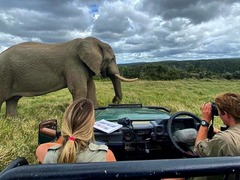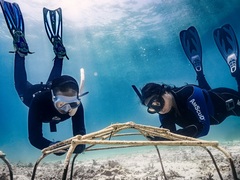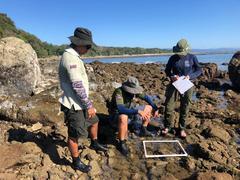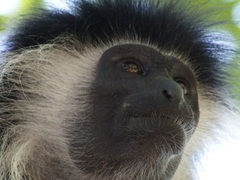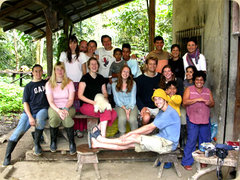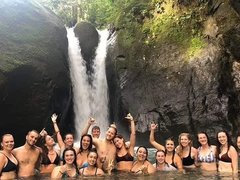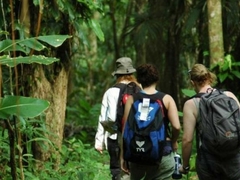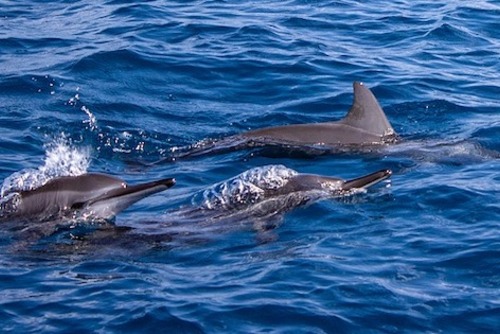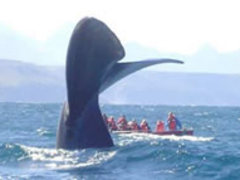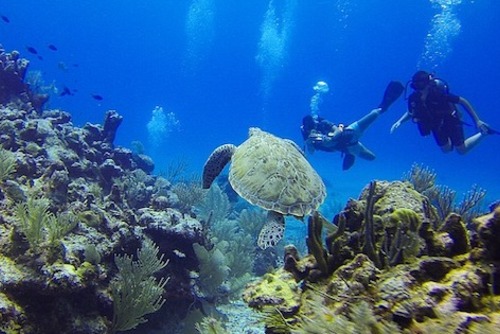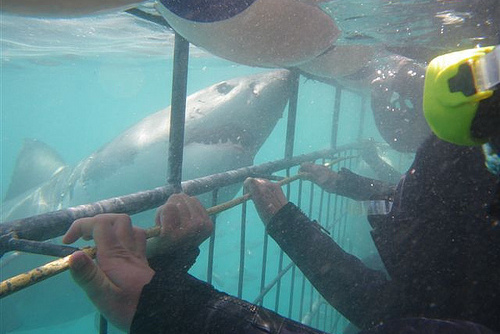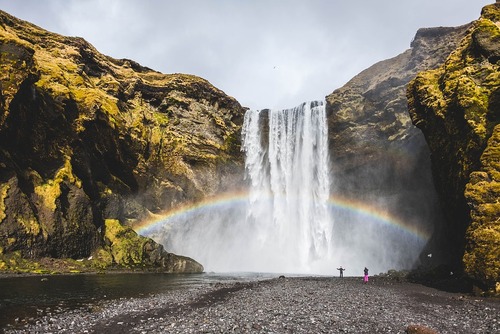In 2009, we recieved accreditation as an advanced outpost of the Atlantic Forest Biosphere Reserve by UNESCO.
Volunteer Research and Non-Research Roles at IPBio:
1) Bioluminescent Mushroom Program: There are approximately 71 species of bioluminescent mushrooms in the world and Iporanga holds 12 species making it the region the highest concentration of bioluminescent mushrooms in the world. IPBio wishes to develop a protocol that allows us to grow them in the lab under controlled conditions. Our cultivation program conducts experiments on: substrate compositions, sterilization method, inoculation method, and fruiting techniques to optimize the process of cultivation.
2) Amphibian Researcher: IPBio conducts research on amphibian reproductive habits and embryology. Volunteer accompany the development of tadpoles and frogs in captivity. In addition, we conduct regular inventories of amphibians using pitfalls that are distributed throughout the reserve.
3) Tree Inventory and Monitoring: Volunteers can support our tree inventory program by conducting field collections of leaves/flowers and fruits/seeds on our trails. In addition, literature research is conducted to gather information on morphological characteristics, occurrence, wood, utility, ecological information, phenology, seeds description and seedling production for each species. Once all our trails have been inventories, we can begin to monitor the growth and well-being of the reserves forest and compare different areas of the reserve.
4) Aquarium Research and Maintenance: IPBio conducts research on native species of fish in an attempt to reduce the dependence on exotic fish in local fish farms. This is important as exotic fish are often introduced into our ecosystem and compete with our native species causing species extinction. The volunteer would be in charge of accompanying this experiment with a native species called Lambari. In addition, the volunteer is in charge of feeding the fish, cleaning the aquariums and monitoring water conditions of the aquarium.
5) Bioacoustics Research: IPBio received a grant from Wildlife Acoustics whereby they donated 2 bioacoustics recorders and software to analyze the data. We are attempting to understand peak activity times for different species throughout the 24 hours in a day. This study will be conducted over the years to develop monthly/seasonal peak activity period for species. In addition, IPBio wishes to create a `sound bank´ of all the species on the reserve.
6) Biodiversity Research Assistant: The Biodiversity Research Assistant role can take many forms. Either you will be assigned to: a specific research project as an assistant; split your time between a couple of projects; or assist in all research projects where needed. This role allows volunteers to get a feel for all the research that IPBio conducts.
7) Photographers and Movie Producers: IPBio uses cameras for research on wildlife and as a result our biologists developed a passion for photography and filmmaking. Our interest in the interplay of photography, research and education lead to the creation of OBBIO – Observatory for Biodiversity, which captures footage aimed at producing eBooks, documentaries, and educational videos as well as using the images for research purposes. For example, our videos have been sold to Discovery Channel. Videos about the volunteer program are also needed every month as well as great photos for the website.
8) Reserve Maintenance and Gardening: Our gardener, Rafael, always needs help maintaining the grounds, trails, animal enclosures, vegetable patch and microclimate greenhouse so if you are interested in getting your hands dirty then we always have a job for you. Moreover, we have many gardens so planting flowers and tree as well as watering them and keeping their patches weed-free is essential. This job requires volunteers who are willing to conduct heavy physical activity.
9) Communications: Help raise awareness about the Institute and its projects. Support our communications by: improving our website and social media; creating informative videos; setting up material to inform students and universities about courses we offer; writing grant and fundraising; seeking partners for our Institution.
10) Volunteer Coordinator: IPBio currently has a full-time staff member dedicated to the management of the volunteer program, however, with this increase in capacity we are looking for a Volunteer Coordinator who can support the Volunteer Manager in organizing the daily tasks of volunteers. The volunteer coordinator must be able to learn about the various projects quickly and have leadership qualities. The volunteer coordinator is in a position our authority and thus must accept the responsibility that comes with this role.
Life at IPBio
Volunteers will stay at the Darwin House, situated on the reserve itself, which accommodates up to 8 people in 2 rooms. This house has a bathroom with a hot shower and has a fully equipped kitchen where volunteers can cook.
Every day you will wake up to the sound of birds, monkeys and frogs and can explore the reserves grounds. Our town is called the Cave Capital of Brazil so volunteers often visit our state parks to explore the caves. Hike into the dense forest and visits to waterfalls are also common activities. Bouy cross, big balloons, are used to drift down the rivers, some of the river route are 3 hours long! After work volunteers can swim on the reserve deck, organize dinners, watch movies, read and go wildlife watching. On the weekend we often have a barbeque or organize dinner at a restaurant. Often there are social events or parties in the community that volunteers can go to.
Requirements
1) that you are over 18; 2) that you speak either English or Portuguese at a high level and 3) you stay for a minimum of two weeks; 4) Have travel and medical insurance
Cost
Volunteers at IPBio are required to pay 425 reais a week (approx. 136 US dollars a week). This covers your accommodation, full access to the reserve, internet access and the use of any equipment we have. Volunteers will pay for their own food and cook for themselves. Volunteers are also responsible for paying for any extra costs such as travel costs, visa costs or etc.
How to Apply
Send an enquiry and express which project(s) you are interested in.

